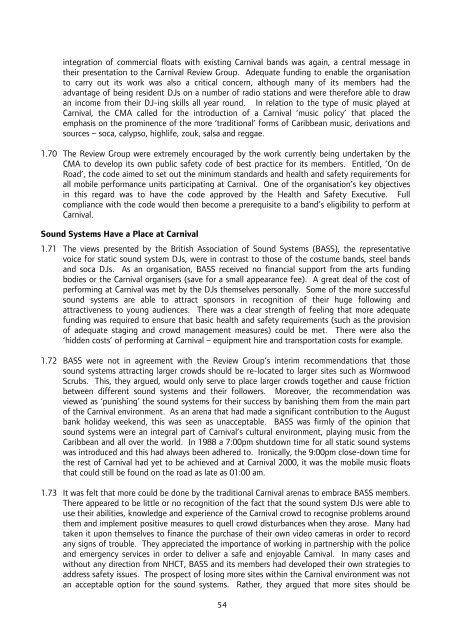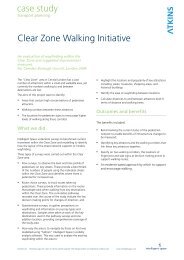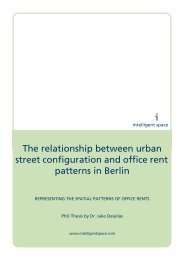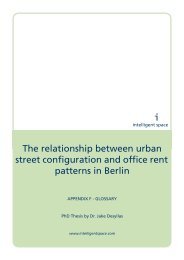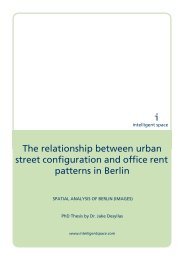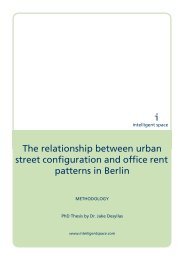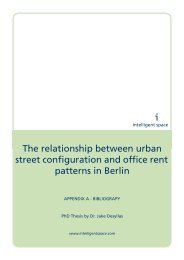Notting Hill Carnival Strategic Review - Intelligent Space
Notting Hill Carnival Strategic Review - Intelligent Space
Notting Hill Carnival Strategic Review - Intelligent Space
You also want an ePaper? Increase the reach of your titles
YUMPU automatically turns print PDFs into web optimized ePapers that Google loves.
integration of commercial floats with existing <strong>Carnival</strong> bands was again, a central message in<br />
their presentation to the <strong>Carnival</strong> <strong>Review</strong> Group. Adequate funding to enable the organisation<br />
to carry out its work was also a critical concern, although many of its members had the<br />
advantage of being resident DJs on a number of radio stations and were therefore able to draw<br />
an income from their DJ-ing skills all year round. In relation to the type of music played at<br />
<strong>Carnival</strong>, the CMA called for the introduction of a <strong>Carnival</strong> ‘music policy’ that placed the<br />
emphasis on the prominence of the more ‘traditional’ forms of Caribbean music, derivations and<br />
sources – soca, calypso, highlife, zouk, salsa and reggae.<br />
1.70 The <strong>Review</strong> Group were extremely encouraged by the work currently being undertaken by the<br />
CMA to develop its own public safety code of best practice for its members. Entitled, ’On de<br />
Road’, the code aimed to set out the minimum standards and health and safety requirements for<br />
all mobile performance units participating at <strong>Carnival</strong>. One of the organisation’s key objectives<br />
in this regard was to have the code approved by the Health and Safety Executive. Full<br />
compliance with the code would then become a prerequisite to a band’s eligibility to perform at<br />
<strong>Carnival</strong>.<br />
Sound Systems Have a Place at <strong>Carnival</strong><br />
1.71 The views presented by the British Association of Sound Systems (BASS), the representative<br />
voice for static sound system DJs, were in contrast to those of the costume bands, steel bands<br />
and soca DJs. As an organisation, BASS received no financial support from the arts funding<br />
bodies or the <strong>Carnival</strong> organisers (save for a small appearance fee). A great deal of the cost of<br />
performing at <strong>Carnival</strong> was met by the DJs themselves personally. Some of the more successful<br />
sound systems are able to attract sponsors in recognition of their huge following and<br />
attractiveness to young audiences. There was a clear strength of feeling that more adequate<br />
funding was required to ensure that basic health and safety requirements (such as the provision<br />
of adequate staging and crowd management measures) could be met. There were also the<br />
‘hidden costs’ of performing at <strong>Carnival</strong> – equipment hire and transportation costs for example.<br />
1.72 BASS were not in agreement with the <strong>Review</strong> Group’s interim recommendations that those<br />
sound systems attracting larger crowds should be re-located to larger sites such as Wormwood<br />
Scrubs. This, they argued, would only serve to place larger crowds together and cause friction<br />
between different sound systems and their followers. Moreover, the recommendation was<br />
viewed as ‘punishing’ the sound systems for their success by banishing them from the main part<br />
of the <strong>Carnival</strong> environment. As an arena that had made a significant contribution to the August<br />
bank holiday weekend, this was seen as unacceptable. BASS was firmly of the opinion that<br />
sound systems were an integral part of <strong>Carnival</strong>’s cultural environment, playing music from the<br />
Caribbean and all over the world. In 1988 a 7:00pm shutdown time for all static sound systems<br />
was introduced and this had always been adhered to. Ironically, the 9:00pm close-down time for<br />
the rest of <strong>Carnival</strong> had yet to be achieved and at <strong>Carnival</strong> 2000, it was the mobile music floats<br />
that could still be found on the road as late as 01:00 am.<br />
1.73 It was felt that more could be done by the traditional <strong>Carnival</strong> arenas to embrace BASS members.<br />
There appeared to be little or no recognition of the fact that the sound system DJs were able to<br />
use their abilities, knowledge and experience of the <strong>Carnival</strong> crowd to recognise problems around<br />
them and implement positive measures to quell crowd disturbances when they arose. Many had<br />
taken it upon themselves to finance the purchase of their own video cameras in order to record<br />
any signs of trouble. They appreciated the importance of working in partnership with the police<br />
and emergency services in order to deliver a safe and enjoyable <strong>Carnival</strong>. In many cases and<br />
without any direction from NHCT, BASS and its members had developed their own strategies to<br />
address safety issues. The prospect of losing more sites within the <strong>Carnival</strong> environment was not<br />
an acceptable option for the sound systems. Rather, they argued that more sites should be<br />
54


